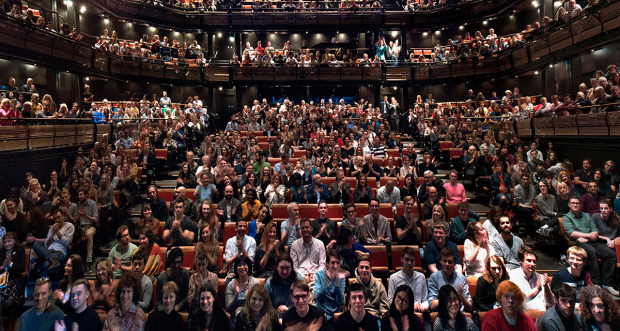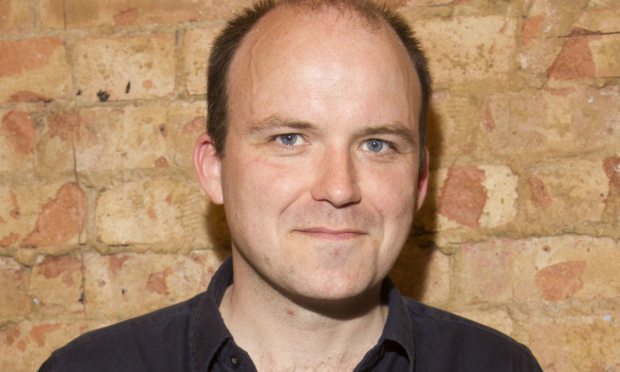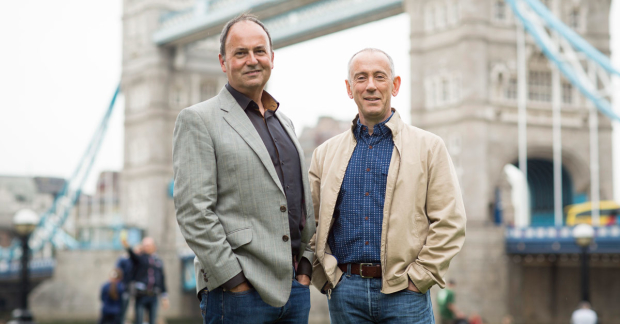Review: Young Marx (Bridge Theatre)
A new theatre is always something to celebrate and the Bridge is particularly worthy of three rousing cheers. The dream child of Nicholas Hytner and Nick Starr, designed by Steve Tompkins, it is both glamorous and practical. Its burnished wood, comfortable seats and expansive public spaces make it warm and welcoming. The auditorium is both intimate and imposing. It feels good to be there, which is really all you can ask.
The play with which it opens, written jointly by Richard Bean and Clive Coleman, shares many of the space’s characteristics. Telling the story of Karl Marx’s early years in London from 1850, when he wasn’t so much revolutionary as revolting, it is original, fresh, expansive and full of passion. I enjoyed every single second of it without ever being quite convinced that it is entirely successful as a coherent play.
What it is, definitely, is very funny indeed. Bean wrote One Man, Two Guvnors, which gave Hytner such a hit in his previous incarnation as the artistic director of the National Theatre. The same talent for spiralling farce is evident here.
Young Marx opens in the shop of Mr Fleece. Marx is trying to pawn a silver gravy warmer that once belonged to the Duke of Argyll and has been inherited from her aristocratic Scottish relations by his high-born wife Jenny. Naturally no-one believes that this penniless Jewish refugee has any right to own such a fine piece; he must have stolen it and the police are quickly called.
The scene, based almost entirely in fact, sets the tone of the drama. It is full of good jokes – including one that runs through the evening about the nascent police force, formed in exactly the period of Marx’s London sojourn. "My singular offence is to be poor. Can you arrest me for that?" Marx asks. "Dunno. Policing’s new to us all," comes the reply. But the writing also allows Marx, in the charismatic shape of Rory Kinnear, to expound on the nature of exchange and capital.
It’s sharp and clever, both intellectually adept and physically vigorous, particularly when Kinnear scrambles up to the top of Mark Thompson’s imposing walled set, and runs across the rooftops like an early Dick Van Dyke. All subsequent shifts of gear – into Marx’s home where his wife is desperate, his son sick and the bailiffs are taking all the furniture, or to a meeting of febrile emigrees, plotting the downfall of the state – are kept running with conviction by Hytner’s energetic direction. A fist fight in the British Library, where Marx encounters Charles Darwin, is a particular joy.
Each detail is nicely observed. Mark Henderson’s lighting casts every interior in its own evocative glow. The Marx family speak without accents among themselves and yet sound very German to the surrounding community. They also have a complex series of coded knocks to warn them who is at the door. Marx spends a great deal of time in a cupboard when the caller is unwelcome or unfriendly but when Oliver Chris as Engels arrives, bearing bonhomie and cash, you can almost feel the relief.
The play pivots on this relationship, presenting it both as comic – they perform rhyming songs together celebrating "the brilliant Marx and Engels, Europe’s finest double act" – and deeply felt. The scene where Engels chides Marx for not understanding the conditions in which the working people of Manchester are living is one of the most moving in the play.
For all its humour there is a political force behind the play, revealing the power of Marx’s analysis, and going some way to explaining why people thought his philosophy was so important that they would sacrifice personal comfort and even their lives to help him expound it.
I’d have liked to see more emphasis on the women in the Marx universe and less on a Prussian spy plot, particularly since Nancy Carroll as Jenny and Laura Elphinstone as the housekeeper Nym give beautifully observed performances. Carroll is all tender desperation and Elphinstone full of gruff practicality but they are squeezed for space by the action unfurling around them.
At the heart of that is Chris, whose Engels has an appealing grace and easy warmth, and of course Kinnear, proving once again what a fine actor he is. It would be very easy to hate the Marx presented here – a solipsistic egotist with no concern for those around him. Yet Kinnear beautifully endows him not only with wit and vigour but with a suggestion of the genius and intelligence that makes others love him. He is hard to resist. As are both play and theatre. It’s a jolly good start.
Young Marx runs at the Bridge Theatre until 31 December and will be broadcast via NT Live across the UK on Thursday December 7.














